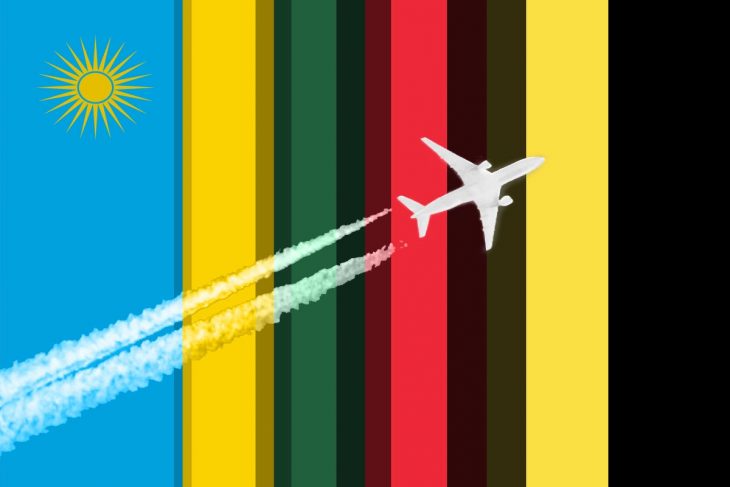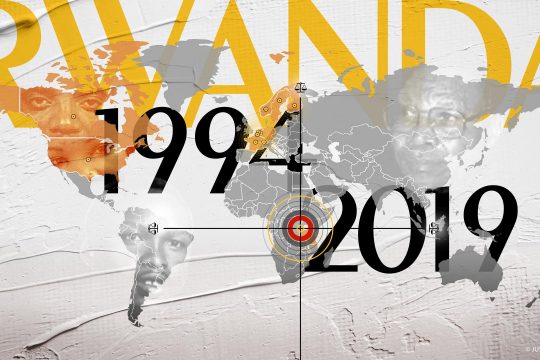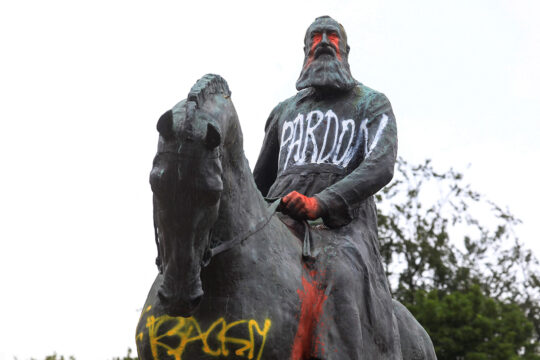Belgium, which is the European country with the most judgments to date linked to the 1994 Tutsi genocide in Rwanda, arrested three new suspects in early October. They were taken into custody while the investigation continues.
The suspects were arrested during "three searches carried out on September 29 and 30, 2020, in the judicial districts of Brussels and Hainaut," announced the Federal Prosecutor's Office in a statement on October 6. The investigations concern, he said, "serious violations of international humanitarian law committed in Rwanda during the genocide of Tutsis in 1994 in Kigali" for which "several international rogatory commissions have been carried out" in Rwanda.
“All Kigali came to Basabose’s house”
The best known among them is Pierre Basabose. A former member of the Rwandan army, he was notably the driver for Colonel Elie Sagatwa, brother-in-law and private secretary to former President Juvénal Habyarimana, whose assassination on 6 April 1994 was the trigger for the Tutsi genocide. Sagatwa was also killed in the attack.
In the early 1990s, Basabose was best known for the foreign exchange office he ran across the street from the main market in Kigali. After his retirement from the army, he dedicated himself to business and enjoyed a meteoric rise in prosperity thanks to the support of the presidential family.
"When you came back from a mission abroad, the first thing to do, after resting, was go to Basabose's house and change into Rwandan francs the dollars or euros that were left in your pocket. There were certainly other money changers, but I only knew Basabose," recalls a former officer, now a big poultry farmer, who wishes to remain anonymous.
Senior government officials, journalists from the government press, all passed by to "greet" Basabose on their return from travels. "The years 1992-1993, during which delegations went almost every month to Tanzania for negotiations with the Rwandan Patriotic Front (RPF) rebels were a godsend for him," says an old lady who worked in a pharmacy near "Chez Basabose".
Money and arms
But what rank did he really hold in the business community? Was he one of the wealthiest people in the country? It's hard to say. All we know is that he was quick to dip into his pocket to support causes that were close to President Habyarimana's heart. In 1993, after the president, he became the second largest shareholder in the infamous Radio-Television Libre des Mille Collines, which was known for its calls for ethnic hatred before and during the genocide.
After the genocide and the fall of the interim government in July 1994, Basabose's main concern was to go to Europe. He arrived in Belgium in 1995 from Germany. He immediately started a small business, selling old books, before opening a store in Molenbeek, a commune of Brussels. In Belgium, he obtained the status of political refugee and had, according to our information, begun the process to acquire citizenship, which ran up against the investigation opened against him.
The details of his arrest warrant are not known, but sources in the Rwandan Attorney General's Office claim that during the genocide Basabose distributed money and weapons to militiamen in Gatenga and Gikondo, neighborhoods of the capital Kigali, to encourage them to kill Tutsis. Jean Flamme, Basabose's lawyer, retorts that the Belgian prosecutor's office is prolonging the "victor's justice" begun, according to him, by the former International Criminal Tribunal for Rwanda (ICTR), and "participating in the fabrication of files as organized by the Rwandan prosecutor's office through prepared witnesses”.
Twahirwa and the President’s ire
The second suspect arrested in Belgium, a former militia leader named Séraphin Twahirwa, is also a relative of the former presidential family. "Although very summarily educated, he had a good position in the Ministry of Public Works," said one of his former colleagues in the ministry. His father was a cousin of the powerful Protais Zigiranyirazo, the president's brother-in-law. Nicknamed "Mr. Z," Zigiranyirazo was acquitted by the ICTR.
It was in 1993 that his neighbours discovered Twahirwa's true weight. He was arrested by the gendarmerie in connection with a suspected homicide committed by guards at his home in Gatenga. The news reached the ears of the Head of State, who immediately summoned the Minister of Defence. In his book "Rwanda: From Party-State to Garrison State", minister James Gasana recounts his appearance on 10 June 1993 before the president, who was incensed. "The president told me that I had set the gendarmerie on a member of his family, and wanted me to release him," writes the former minister. "I told him that I could not interfere with legal proceedings in which I had no jurisdiction.”
“Habyarimana won’t be the only one buried”
Feeling threatened, Gasana fled the country. Twahirwa was released and returned triumphantly to his neighborhood, more determined than ever to prove his loyalty to the presidential family. It is with this frame of mind that he learned of the death of his relative Habyarimana on the evening of April 6, 1994. Erasto Ntihabose, who lived in the Gatenga neighborhood, remembers hearing him raging at least twice: "The RPF and the Tutsis killed the father of the nation. They must pay dearly. Habyarimana will not be the only one buried." Twahirwa and his Interahamwe quickly became the masters of the neighborhood.
"On 26 May 1994, RPF-Inkotanyi troops took most of the localities of the city of Kigali, including Kicukiro and Gatenga, and rescued Tutsi survivors and other people who were still in the hands of the killers. Gatenga was occupied by numerous Interahamwe led by Twahirwa Séraphin," writes Jean-Damascène Bizimana, executive secretary of the National Commission for the Fight against Genocide (CNLG), in a document published on 29 May.
Christophe Ndangali, the “academic”
The third suspect arrested in Belgium, Christophe Ndangali, has a very different profile. A graduate of the Faculty of Letters of the National Educational Institute, he first became a teacher before embarking on a long career as a senior manager in the Ministry of Education. In 1994, he was the minister's chief of staff and a member of the central committee of the presidential party, the MRND, in his home prefecture of Byumba.
After his arrival in Belgium, he worked in the office of a lawyer of Rwandan origin, before studying law and opening his own practice. At the same time, this intellectual made many interventions in the Rwandan media in exile, and published articles and books. According to the CNLG, he is part of a group of intellectuals from northern Rwanda who incited the genocide of Tutsis as early as 1993. Rwandan authorities also accuse him of supervising massacres at certain checkpoints in Kigali in 1994. He has consistently claimed he is innocent.
“No link” with Kabuga’s arrest
The arrest of these three men in Belgium followed the arrest, five months earlier in France, of Félicien Kabuga, who is said to have been the main financier of the genocide. Kabuga had been evading international justice for more than 20 years. To get their hands on the old fugitive, the UN mechanism that took over from the ICTR called on the police services of several Western countries, including Belgium.
“I don't see a direct link between the Kabuga case and the arrest of the three Rwandan genocide suspects in Belgium,” says Professor Phil Clark who teaches international and comparative politics at the University of London’s School of Oriental and African Studies (SOAS). “All of this fits a wider pattern of Rwanda's vigorous pursuit of genocide suspects around the globe. It is a high priority for the Rwandan government - inspired by Israel's experience of continuing to hunt Holocaust suspects decades after their alleged crimes.”
While Kabuga was a fugitive, the three new suspects had known addresses in Belgium and were living openly.
WILL THE NETHERLANDS EXTRADITE JOSEPH MUGENZI?
The arrest of Joseph Mugenzi in the Netherlands on October 27th comes on top of the arrests in Belgium. Very active within the Rwandan opposition in exile, Mugenzi had been living in the Netherlands for 20 years. In Rwanda, he was an employee of the National Bank of Rwanda (BNR) in the capital Kigali, where he also owned a pharmacy.
While Belgian and French judicial authorities have chosen to try arrested suspects on their own territory, Dutch judicial authorities have in some cases extradited suspects at Rwanda's request. So will Mugenzi be sent back to the judges in his home country, who accuse him of having drawn up a list of Tutsis to be killed in two neighbourhoods of the capital in 1994? "We hope he will be extradited as we requested in 2015," Faustin Nkusi, spokesman for the Kigali Attorney General's Office, told reporters the day after the arrest.
In the Netherlands, “trials are now the true exception as the policy is very much projected at sending atrocity crime cases back to the countries where crimes took place, and where witnesses live”, says Thijs Bouwknegt, a historian at the NIOD Institute for War, Holocaust and Genocide Studies in Amsterdam.








